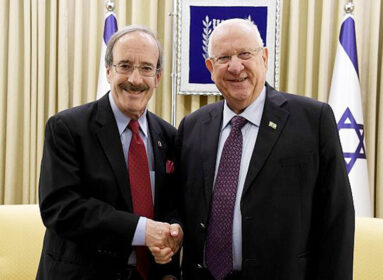By Cindy Mindell ~
ANSONIA – Howie Kreiger can point to a high-water mark on the outside of his building, a reminder of the great flood of Aug. 19, 1955, when the rains brought by Hurricane Diane caused the Naugatuck River to overflow.
The brick building has housed Spector Furniture, a business started in 1890 by Simon Spector.
“There was six feet of water in the store and all the furniture washed out the front window,” says Kreiger, 49, who grew up hearing the story. “There was no insurance then and the whole community helped out everybody else.” The mark is six feet up from the sidewalk, and was once accompanied by a plaque memorializing the natural disaster.
Kreiger represents the fourth generation to run a business established by one family and bought by another. After Simon retired, son George took it over, later joined by his nephew, Larry Winer. When George retired in 1969, David Kreiger closed his hardware store in Shelton and became Winer’s partner in Spector Furniture.
David Kreiger passed away in 1982 at age 59. His oldest son, Kenny, who had been working in the furniture business in Boston, joined the Ansonia store. Howie graduated from Syracuse University and worked at a Levitz furniture store, then followed his brother into the business. Now the two Kreiger brothers run Spector.
The Kreiger family history reflects that of the Jewish community of the lower Naugatuck Valley. David’s grandparents, Abraham and Sarah, emigrated from Russia to Shelton, joining cousins already in Derby and Ansonia. Abraham ran a pushcart and worked in area factories until he had saved enough money to buy a building on Howe Avenue in Shelton. He ran a business on the first floor and the family lived on the floor above. Eventually, he opened A. Kreiger, Inc., the hardware store that grandson David would inherit after graduating from the Wharton School of the University of Pennsylvania.
According to “The American Synagogue: A Historical Dictionary and Sourcebook” (Greenwood Press, 1996), Jews settled in the lower Naugatuck Valley in the late 1800s, first from Germany and later from Eastern Europe. They began to gather for worship services by 1891 and, a year later, the newly founded B’nai Israel leased space on Water Street in Ansonia. The group was formally chartered in 1893 and built a synagogue three years later, on Colbern Street.
In 1915, some 34 Jewish families from Derby and Shelton established Congregation Sons of Israel, meeting in a building on Main Street with Rabbi Solomon Siegel as spiritual leader. A group split off and formed the B’nai Jacob congregation. In 1932, a Jewish community center was established, which ran a Sunday school for girls that merged with the Sons of Israel Sunday school in 1948.
B’nai Israel and B’nai Jacob merged into Beth El, which was housed in the B’nai Jacob building. In 1958, Congregations Beth El and Sons of Israel, along with the Ansonia-Derby Jewish Community Center, merged into Beth Israel Synagogue Center, building a new facility a year later on Seymour Avenue in Derby. As late as 1995, the congregation numbered some 200 families. Two years later, Beth Israel merged with Congregation Or Shalom in Orange.
In 1964, the Kreigers moved from the small Jewish community of Shelton to the even smaller one of Woodbridge, and continued to attend Beth Israel. Howie says that a lot of the congregation was made up of working-class Jews and small-business owners like his father. By the late ‘90s, most of the Jewish community had relocated to the New Haven suburbs.
“At one time, Beth Israel was a vibrant, very active place, more like a community center,” says Howie’s mother, Sylvia Frummer. “Everybody had meetings there – Sisterhood, Hadassah, B’nai B’rith.”
While Spector Furniture is a living vestige of that once-thriving Jewish community, Howie Kreiger attributes the longevity of the business to customer service, a traditional business value he learned from the late Larry Winer and his own brother, Kenny.
“We can’t be everything to everybody,” he says. “But if you’re genuine to your customers, if you’re honest and fair, they’ll be back.”







 Southern New England Jewish Ledger
Southern New England Jewish Ledger

















